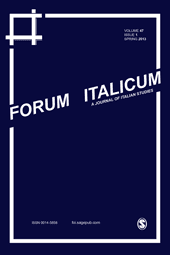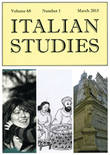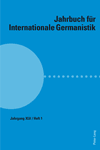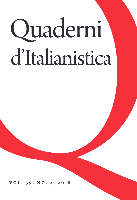
FORUM ITALICUM
Scope & Guideline
Nurturing Academic Excellence Through Open Access
Introduction
Aims and Scopes
- Italian Literature and Poetics:
The journal emphasizes the analysis of Italian literary works across various periods, focusing on their poetic structures, themes, and historical contexts. - Cultural Studies and Interdisciplinary Approaches:
It promotes interdisciplinary research that connects literature with cultural, social, and political issues, examining how these elements interact within Italian society. - Transnational Perspectives:
The journal highlights transnational studies that explore Italian culture in a global context, addressing themes of migration, diaspora, and cultural exchange. - Critical Theory and History:
FORUM ITALICUM engages with critical theory, history, and philosophy, particularly in relation to significant Italian thinkers and movements, fostering discussions on their impact and relevance. - Teaching and Pedagogy:
The journal is committed to advancing pedagogical practices in Italian studies, sharing innovative approaches for teaching language and culture in diverse contexts.
Trending and Emerging
- Intertextuality and Cultural Dialogues:
A growing focus on intertextuality demonstrates how Italian literature interacts with global texts and discourses, fostering a deeper understanding of cultural dialogues and influences. - Postcolonial and Diasporic Studies:
There is an increasing emphasis on postcolonial perspectives and diasporic identities, exploring the complexities of migration, cultural exchange, and the Italian experience in a globalized world. - Ecocriticism and Environmental Humanities:
Emerging themes in ecocriticism reflect a contemporary concern for environmental issues, examining how Italian literature and culture engage with ecological narratives and activism. - Gender Studies and Feminist Critique:
The journal has seen a rise in research addressing gender dynamics, feminist critiques, and the representation of women in Italian literature, highlighting their historical and cultural significance. - Digital Humanities and New Media:
As digital humanities gain traction, the journal explores how new media and digital platforms influence the production, dissemination, and reception of Italian literature and culture.
Declining or Waning
- Traditional Historical Narratives:
There has been a noticeable decrease in publications centered around conventional historical narratives, particularly those that do not incorporate contemporary theoretical frameworks or interdisciplinary approaches. - Purely National Perspectives:
The focus on strictly nationalistic interpretations of Italian literature and culture has waned, giving way to more global and transnational analyses that reflect current academic trends. - Solely Linguistic Studies:
Research that focuses exclusively on linguistic aspects without contextual literary or cultural analysis has diminished, as the field moves towards more integrated approaches that include socio-cultural dimensions. - Static Literary Canon:
The exploration of a static literary canon is less prevalent, with scholars increasingly seeking to challenge and expand traditional boundaries to include underrepresented voices and narratives. - Historical Biographies:
There is a declining interest in biographical studies of historical literary figures that do not engage critically with their works or broader cultural implications.
Similar Journals

GRADIVA
Bridging Classical Insights with Contemporary ThoughtGRADIVA is a distinguished journal published by Casa Editrice Leo S Olschki, focusing on the fields of literature and literary theory. With an ISSN of 0363-8057, this scholarly publication serves as a platform for innovative research and critical discourse within the humanities. Although not currently following an open access model, GRADIVA provides valuable insights into literary studies, encompassing a broad array of topics from classical to contemporary texts. The journal has seen significant evolution, operating from 2002 to 2012 and continuing its legacy from 2017 to 2024. In the 2023 Scopus rankings, it is positioned in the Q4 category, indicating a niche but dedicated place among literature journals, currently ranked at #1055 out of 1106 in the Arts and Humanities field, reflecting its focused yet important contribution to scholarly discussions. Researchers, professionals, and students interested in the intricate interplay of literature and theory are encouraged to engage with this publication, as it remains an essential resource for understanding the dynamics within literary scholarship.

Italian Studies
Uniting Perspectives on History, Language, and the ArtsItalian Studies, published by Routledge Journals, Taylor & Francis Ltd, stands as a distinguished academic platform in the fields of Cultural Studies, History, Linguistics, Language, Literature, and the Visual Arts. Established in 1937, this journal has fostered scholarly dialogue and innovation through its robust contributions and in-depth analyses that bridge historical and contemporary perspectives on Italian culture. With an impressive ranking in Q2 and Q3 quartiles across multiple categories, including Literature and Literary Theory, and a current impact factor reflecting its growing influence, Italian Studies serves as an essential resource for researchers, professionals, and students alike. Although not an open-access journal, it remains accessible via institutional subscriptions, ensuring that a wide audience can engage with its critically acclaimed research and articles. Located in the UK, Italian Studies continues to advance the understanding of Italy's rich cultural heritage, making it a vital cornerstone for those invested in the humanities and social sciences.

Anclajes
Diving into the Dynamics of Human ExpressionAnclajes is a prominent academic journal dedicated to the fields of Cultural Studies, Linguistics, and Literature, published by the UNIV NACIONAL LA PAMPA, FAC CIENCIAS HUMANAS. With both print (ISSN 0329-3807) and electronic (E-ISSN 1851-4669) formats, the journal has embraced an Open Access model since 2010, greatly enhancing its accessibility and reach to a global audience. Based in Argentina, Anclajes provides a platform for innovative research and critical discourse, contributing significantly to the understanding of cultural phenomena and literary theories. In recent years, the journal has established itself with a Scopus rank placing it in the top 30% of Literature and Literary Theory and the top 57% of Cultural Studies, as indicated by its quartile rankings for 2023. With issues converging from 2012 to 2024, Anclajes continues to foster scholarly communication and serves as an essential resource for researchers, students, and professionals seeking to explore the dynamism of human culture and expression.

LINGUA E STILE
Advancing Scholarly Discourse in Linguistics and LiteratureLINGUA E STILE, published by SOC ED IL MULINO, is a distinguished academic journal based in Italy that delves into the intricate realms of linguistics, literature, and philosophy. With an ISSN of 0024-385X, this journal has been a vital platform for scholarly discourse since its inception, covering a broad spectrum of topics from linguistic theory to literary analysis. Although it currently holds a Q4 category ranking in 2023 across multiple disciplines—specifically in Linguistics and Language, Literature and Literary Theory, and Philosophy—it remains committed to fostering insightful contributions that challenge and expand conventional understanding in these fields. While it does not offer open access, the journal diligently focuses on publishing high-quality research that appeals to academics, professionals, and students alike. With the convergence of multi-disciplinary approaches, LINGUA E STILE is positioned to engage with contemporary debates and developments, enriching the academic landscape from its base in Bologna, Italy, and inviting contributions that exemplify the evolving intersections of language and thought.

LETTERE ITALIANE
Fostering a Dialogue on Literary EvolutionLETTERE ITALIANE is a distinguished journal dedicated to the exploration of literature and literary theory, published by Casa Editrice Leo S Olschki in Italy. With its ISSN 0024-1334 and E-ISSN 2035-6315, this journal has established a niche for itself since its inception in 1987, covering a range of scholarly topics in the literary field. Currently categorized in the Q4 quartile for Literature and Literary Theory, it ranks at #964 out of 1106 in Scopus, placing it within the 12th percentile among its peers. Although not an Open Access journal, LETTERE ITALIANE serves as a vital resource for researchers, students, and professionals seeking to deepen their understanding of Italian literature and its evolving theories. The journal's commitment to academic rigor and its focus on critical literary discourse make it an essential addition to any scholar's library.

JAHRBUCH FUR INTERNATIONALE GERMANISTIK
Connecting Scholars through Innovative ResearchJAHRBUCH FUR INTERNATIONALE GERMANISTIK is a prominent academic journal published by VERLAG PETER LANG AG, dedicated to advancing research in the fields of German studies, literature, and linguistics. With its ISSN 0449-5233 and E-ISSN 2235-1280, this journal provides a platform for scholarly discourse, critical analysis, and innovative studies related to German language and literary theory. Although its coverage in Scopus was discontinued in 2014, the journal continues to be influential within the academic community, evidenced by its rankings in the Arts and Humanities and Social Sciences categories. Specifically, it holds a rank of #397 in Literature and Literary Theory and #477 in Language and Linguistics, reflecting a solid presence among peers. Researchers and students alike can benefit from its insightful articles that delve into various dimensions of Germanistik, thereby fostering a greater understanding of language and cultural contexts. For those interested in contributing to this field of study, JAHRBUCH FUR INTERNATIONALE GERMANISTIK serves as an essential resource for high-quality scholarly content.

QUADERNI D ITALIANISTICA
Unveiling the Rich Tapestry of Italian LiteratureQUADERNI D ITALIANISTICA is a distinguished journal dedicated to the field of Italian Studies, focusing on literature and literary theory. Published by QUADERNI D ITALIANISTICA and based in Canada, this journal serves as a platform for scholars, researchers, and students alike to engage with critical analyses and scholarly contributions related to Italian literature. Although it has a Q4 ranking in the 2023 category of Literature and Literary Theory and a Scopus rank of #655 out of 982, the journal plays a pivotal role in fostering discourse within this niche. Since its inception in 2002, the journal has contributed significantly to the study of Italian literature, providing a valuable resource for those looking to explore thematic, historical, and narrative aspects of Italian texts. While access to the journal is not offered freely, its comprehensive coverage until 2018 and again in 2020-2021 ensures a rich archive for critical research endeavors. As such, QUADERNI D ITALIANISTICA remains an essential resource for anyone invested in the intricate landscapes of Italian cultural and literary studies.

MESTER
Unveiling New Dimensions in Humanities ScholarshipMESTER is a distinguished academic journal published by the UCLA College of Humanities, known for its commitment to advancing research in the fields of Cultural Studies, Linguistics and Language, and Literature and Literary Theory. With an ISSN of 0160-2764, this journal serves as a vital platform for scholars and professionals to disseminate innovative research and critical perspectives from diverse theoretical frameworks and cultural contexts. Although currently operating without an Open Access model, MESTER continues to uphold a rigorous peer-review process, ensuring that published articles maintain high academic standards. Recognized for its selective focus, MESTER holds a Q4 categorization in Cultural Studies and Linguistics, and Q3 in Literature and Literary Theory, situating it as a relevant, if emerging, voice within these disciplines. Housed within the significant repository of knowledge at UCLA, the journal beckons researchers, students, and practitioners to engage with its contributions to the humanities and build upon its foundations in cultural discourse.

RASSEGNA DELLA LETTERATURA ITALIANA
Engaging with the Diversity of Italian Literary ThoughtRASSEGNA DELLA LETTERATURA ITALIANA is a distinguished Italian literary journal published by CASA EDITRICE G C SANSONI SPA, dedicated to exploring the richness and diversity of Italian literature from historical and contemporary perspectives. With a long-standing commitment to the field since its inception in 1979 and ongoing publication from 2002 to 2023, it serves as a crucial platform for researchers, professionals, and students to engage with significant literary critiques and discussions. Although it currently holds a Q4 ranking in Literature and Literary Theory and is positioned in the 2nd percentile of the Scopus Arts and Humanities category, the journal strives to uplift Italian literary scholarship by providing insightful analyses and fostering scholarly exchange. While it does not offer open access, its curated content remains vital for anyone interested in deepening their understanding of Italian literary heritage and current trends.

JOURNAL OF MODERN ITALIAN STUDIES
Illuminating Italy's Contemporary NarrativesThe Journal of Modern Italian Studies, published by Routledge Journals, Taylor & Francis Ltd, is a premier academic journal that has been at the forefront of exploring the rich and multifaceted dimensions of modern Italian culture since its inception in 1995. With an ISSN of 1354-571X and an E-ISSN of 1469-9583, this journal features a strong focus on Cultural Studies, History, Political Science and International Relations, as well as Sociology, achieving prestigious Q1 and Q2 quartile rankings as of 2023. It occupies an esteemed position in the academic landscape, holding notable Scopus ranks that highlight its significance within the fields of Arts and Humanities and Social Sciences. The journal aims to foster an understanding of Italy's contemporary issues, artistic endeavors, and political narratives, serving as an essential resource for researchers, students, and professionals interested in Italian studies and broader cultural discourses. Although it does not offer open access, its comprehensive and rigorously peer-reviewed articles make it a vital source of knowledge in the vibrant field of modern Italian scholarship.